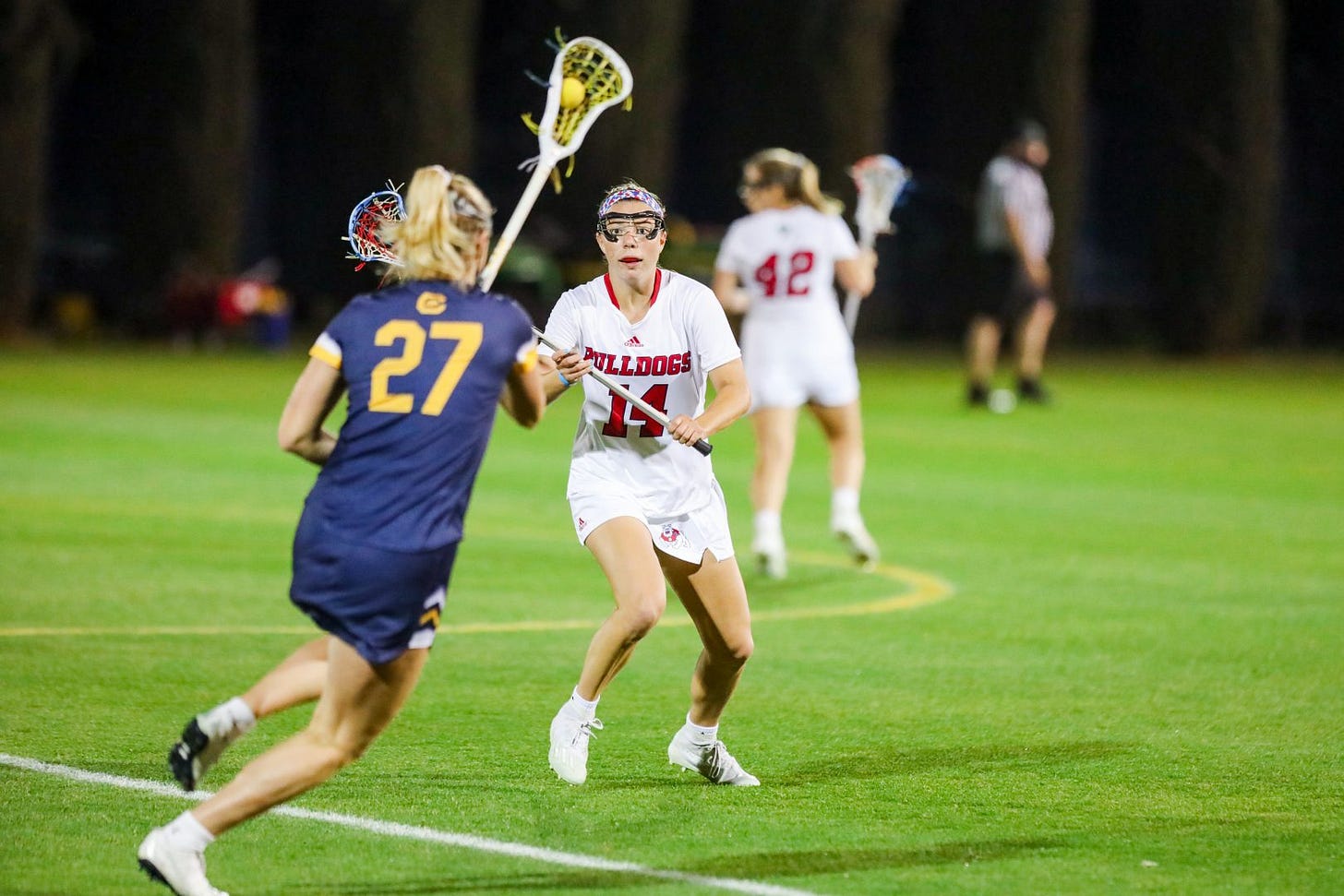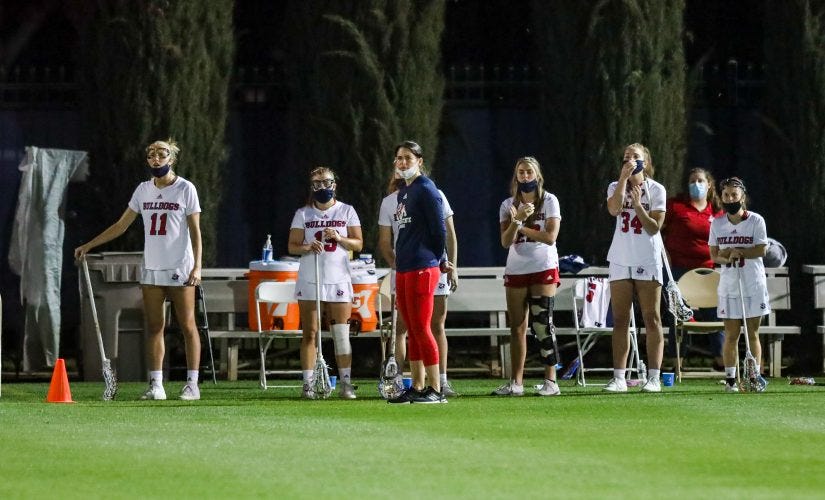Women’s lacrosse loses injunction to halt Fresno State from ending team
If you’re a CSU student journalist or advisor, please fill out this survey to help me do a better job for you. It includes a when2meet link for our next Zoom meeting.
The Fresno State Collegian’s Zaeem Shaikh originally wrote this story, available for republication by CSU papers.
Fresno State lacrosse head coach Kara Concheck watches the game as the team falls behind on the scoreboard during the second half of their home opener against Cal at Soccer and Lacrosse Stadium on Friday, March 5, 2021. (Vendila Yang/ The Collegian)
A federal judge ordered Fresno State to give the women’s lacrosse team equal access to equipment, facilities and funding but refused to order the university to halt its effort to eliminate the lacrosse program at the end of the academic year.
Back in February, five members of the Fresno State lacrosse team filed a class-action sex discrimination lawsuit in February, claiming the university violated the gender equity law known as Title IX. The players also filed a motion for a preliminary injunction to preserve the lacrosse team, and the judge ruled on the injunction motion Wednesday, April 21.
In requesting a preliminary injunction, lacrosse players Megan Walaitis, Abbigayle Roberts, Tara Weir, Hennessey Evans and Taylor Anders filed two motions: one asked to bar Fresno State from cutting the women’s lacrosse team at the end of the academic year and the other asked to require Fresno State to treat the women’s lacrosse team fairly and equally as the case proceeds.
U.S. Senior District Judge for the Eastern District of California Anthony W. Ishii wrote a decision granting the motion for Fresno State to treat the women’s lacrosse team fairly, but he denied the players’ motion to preserve the team without prejudice.
“We were obviously pleased with the decision ensuring the women to prosecute equal treatment but extremely disappointed by the judge’s decision not to grant a preliminary injunction,” said Bailey & Glasser LLP attorney Arthur Bryant, who represents the players in this case.
Fresno State gave a statement to The Collegian on the court’s ruling.
“Fresno State’s decision to eliminate men’s tennis, men’s wrestling and women’s lacrosse as a result of significant budgetary impacts caused by the pandemic was extremely difficult, and one we wish could have been avoided. Nonetheless, we are pleased with the court’s ruling because it confirms that the decision to eliminate these sports complies with Title IX,” the university said.
With the players’ equal treatment claim, the five lacrosse players provided written testimonies as exhibits in the lawsuit filed in February, alleging disparities in publicity, equipment, COVID-19 protocols and facilities. Since Fresno State did not give a response to these allegations, the court wrote that it can conclude that the players’ testimonies showed inequities at the program level.
The court also said it finds a likelihood of irreparable harm given the fleeting nature of college athletics and the insult that comes from unequal treatment. It also sees nothing burdensome or inequitable about requiring Fresno State to comply with applicable law since upholding Title IX is in the public interest.
Ishii wrote Fresno State must do the following for the remainder of the team’s season: provide a dedicated locker room and practice space, equip the team for competition and provide the team with funding and benefits on par with the average given to other Fresno State varsity teams.
The university said in its statement to The Collegian that lacrosse athletes had been provided with these things before the court’s decision and before the lawsuit was ever filed.
“As for that part of the court’s decision instructing the Athletic Department to provide certain funds and benefits to the members of the women’s lacrosse team through the end of the academic year, it is important to affirm that the lacrosse student athletes had been provided with such funds and benefits before the court’s decision, and in many instances, before the lawsuit was ever filed,” the university said.
The team only has two weeks left in the season. It will host senior day this Saturday against UC Davis. The Bulldogs are 1-10, with their lone victory coming against Kent State on Feb. 19. Fresno State is a member of the Mountain Pacific Sports Federation, which also consists of UC Davis and San Diego State. Next week, the MPSF lacrosse championships will be played at Fresno State.
The court denied the players’ motion to preserve the team based on Title IX’s three-part test of providing equitable opportunities to men and women in sports.
Title IX was passed in 1972 to provide women more opportunities in intercollegiate athletics. Under this law, in order for universities to show compliance, they must prove that they are meeting at least one of the following standards as part of a required three-part test.
Universities need to show that intercollegiate athletic participation by sexes is substantially proportionate to undergraduate enrollment, that they’re continuing to expand opportunities for the underrepresented sex or that they’re accommodating the interests and abilities of the underrepresented sex. Universities must also show equity with financial aid and athletic spending.

Fresno State announced on Oct. 16 that it will be cutting women’s lacrosse, men’s tennis and the wrestling program by the end of the academic year, and the athletic department said these cuts were in response to the ongoing financial challenges that the organization has faced during the COVID-19 pandemic. After the lacrosse team was cut, the players retained Bryant as their attorney and threatened litigation before eventually filing a lawsuit in February.
“Make no mistake: Fresno State remains committed to compliance with Title IX by providing equitable opportunities for its women’s sport programs. We hope this decision by the court will provide resolution of this matter. Fresno State will continue to support all of our student-athletes who have been impacted by these sport team reductions,” the university added in its statement to The Collegian on Friday.
The lacrosse players who sued Fresno State say the university doesn’t pass the effective accommodation test since the percentage of female athletes at Fresno State isn’t substantially proportionate to the percentage of undergraduate female students.
According to court records, Fresno State acknowledged that it was not compliant in its proportionality requirement in the 2019-20 academic year. Undergraduate enrollment in that academic year was 40.4% male and 59.6% female, but 56% of female student athletes made up a total of 559 roster spots while males made up 44%. This means there was a 3.6% gap between undergraduate female enrollment and female student athletes, more than the 2% standard, according to the court.
But the university said it will be compliant after cutting wrestling, men’s tennis and women’s lacrosse. Initial numbers that Fresno State presented for the 2021-22 academic year predict that undergrad enrollment will be the same as last year at 39.5% male and 60.5% female, and 59.2% of female student athletes will make up a total of 502 spots while males will make up 40.8%.
With these projected numbers from Fresno State, there’s only about a 1.3% disparity between female enrollment and female participation opportunities, meaning the university would be in compliance with Title IX.
Bryant argues that Fresno State can’t assume that undergrad enrollment will remain the same given the projected increase in females in 2019-20 from 59.6% to 60.5% in 2020-21. Instead, the plaintiffs say the correct numbers to compare are 2019-20 athletic participation opportunities and enrollment percentages for 2020-21, which would show that Fresno State has a female participation gap of 31 roster spots — a number greater than the number of athletes needed for a women’s team. With this comparison, Fresno State would not meet Title IX compliance.
The court argues that Bryant and the players made a “fatal flaw” in their approach by testing 2019-20 participation opportunities against 2020-21 undergrad enrollment. The court said the plaintiffs ignored the impact of increased female enrollment at Fresno State as male student enrollment dropped by 29 from 2019-20 to 2020-21 while female enrollment increased by 397, further expanding the gap between male and female enrollment by 426 students.
“Ignoring the impact of increased female enrollment (and, to a lesser extent, decreased male enrollment) on participation opportunities while nonetheless using a female enrollment percentage based on those very changes to set — and raise — the strict compliance threshold is obviously improper. Plaintiffs, in other words, cannot have it both ways,” Ishii wrote in his decision.
Bryant said that he and the players have always used the most available best data that they had access to.
The court says Bryant and the players must use 2019-20 participation opportunities against 2019-20 enrollment in order to properly test proportionality. The court says that by using these numbers the participation gap would be 19 and not 31, which would be substantially proportionate.
Regarding Bryant and the players’ claim that undergrad enrollment won’t remain the same, the court also said even if undergrad enrollment increased in 2021-22, Fresno State would still meet compliance as it’s “unreasonable to expect that nearly 400 new female graduates will collectively account for 14 additional participation opportunities.”
Bryant said this statement made by the judge is not how participation works in college athletics.
“Team sizes are primarily determined by the university and the average team size from past years,” he said. “So, you can have an enormous increase or decrease in undergraduate enrollment, and it won’t affect participation rates in athletics unless the school decides to change the size of the team.”
He added that never got addressed because there was no chance to discuss it in court with no hearing.
Thus, the court said fixing this analytical flaw made by the plaintiffs shows that Fresno State is in Title IX compliance. Beyond this academic year, Fresno State’s projections for 2021-22 only show a 1.34% disparity, so the court ruled that Fresno State has shown it will be in Title IX compliance after the cuts.
There has been no trial date set, but Bryant said this will be a long battle.
“Our intent is to keep fighting to see what happens… We’re absolutely confident we are going to prove that Fresno State is discriminating against its women athletes by denying them equal opportunities to participate, equal financial aid and equal treatment,” he said.
Written with a contribution from Jesús Cano




